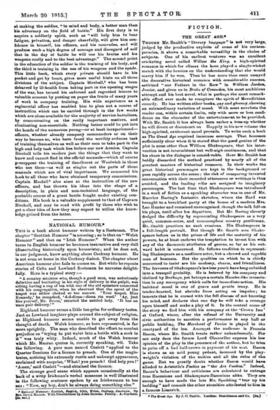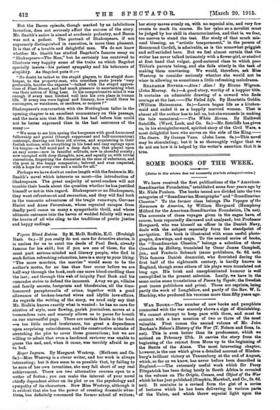FICTION.
THE GREAT AGE.* Tnoueu Mr. Snaith'e " literary baggage" is not very large, judged by the productive exploits of SOON of his content.
poraries, it shows a remarkable versatility in the choice of subjects. One of bin earliest ventures was an excellent °ticketing novel called Willow the King. • high-spirited romance in which for climax the hero played a single-wicket match with the heroine on the understanding that she would marry him if he won. Then he has more than once essayed the decorative bietorisal romance with coueidorable gammas. satirized " our Fathers in the Row " in William Jordan, Junior, and given tut in Broke of Comedy*. his moat ambitious attempt and his best novel. what i. perhaps the most remark- able effort ever made to recapture the spirit of Her odithian comedy. He has written other hooks. gay and Ohm], showing an extraordinary variation of mood. With mast uoveliets the reader can, within certain limits, rely- with more or less confi- dence on the character of the entertainment to be provided. With Mr, Bnaith it has always been rather a toes-op whether be will divert or disconcert ea. Happily in his new volume the high-spirited, exuberant mood prevails. To write such a book as The Great Age required immense eourage. That becomes sufficiently clear when it is stated that the good genius of the plot is none other than William Shakespeare, that his inter. vention is not intermittent but well-nigh tiontinuous, and that his share in the dialogue is conaiderahle. Here Mr. finaith has boldly discarded the method practised by nearly all of the greatest mestere of historical *imams:. in their works the great historical personages arc kept in the background or pass rapidly across the scene: the risk of comparing invented conversation with their recorded utterances or writings is thus avoided, and the leading ram are assigned to imaginary personages. The last time that Shakespeare was introduced in a work of fiction as a speaking character was in one of Mr. Maurice Baring's fantastic sketches, where the Bard was brought to a breakfast party at the house of a modern Mrs. Leo Hunter and remained unrecognised. though the talk fell on his plays, until after Ins departure. But Mr. Baring cleverly dodged the difficulty by representing Shakespeare as a very quiet, common.sense, and commonplace country gentleman. Mr. tinaith practises no such evasions. His Shakespeare is a full-length portrait. But though Mr. Somith seta Shake- speare before se in the prime of life and the uniturity of his powers, he at least eschews the temptation to invest him with any of the daemonic attributes of gemus, so far as his out- ward habit is concerned. He follows tradition in represent.' ing Shakespeare as a mediocre actor, ton a shrewd and capable man of business. But the qnalities on which be is chiefly concerned to ineiat are his modesty, charm, and friendliness. The fervonta of Shakespeare's lawless youth have long subsided into a tranquil geniality. He is beloved by his company and idolised by Burbage, yet betrays a certain Haudet-like irresolu- tion in any emergency which calls for innuodiateaotion. Hie habitual mood is one of grave and gentle irony. He is tender-hearted, but shrinks from acting on impulse; he laments that he is cursed with the fell disease of not knowing his mind, and declares that one day he will take a revenge upon himself and make a play of It. In the central scene of the story we find him with his company st the 'Crown Ion at Oxford, whore, after the refusal of the University and civic authorities to sanction a performance in any hal) of public building, The Merchant of Venice is played in the courtyard of the inn. Amongst the audience is Francis Bacon, whom Mr. Soaith tresta rather unhandsomely. For not only does the future Lord Chancellor express his low opinion of the play in the prmenceof the author, but be tries to palm off a bad half-crown in payment of his seat. Bacon is shown as an acid young pedant, incensed by the play- wright's violation of the unities and all the rules of the game. But we greatly doubt whether BA C°. would have alluded to Aristotle's Poetics as " the An Parttime Indeed, Bacon's behaviour and criticisms are calouhtted to outrage true Baeonians and Shakespeare-Baconian. alike. They are enough to have made the late Mr. Spedding "tear up his bedding" and commit the other atrocities attributed to him is a famous Limerick.
• The am* dot. ay y. M Smith. imam lhachiman sad Ca [sal •
But the Bacon episode, though marked by an infelicitous invention, does not seriously affect the success of the story. Mr. Snaith's satire is aimed at academic pedantry, and Bacon was not a pedant. The portrait of Shakespeare, if not supremely distinguished in execution, is more than pleasant. It is that of a lovable and delightful man. We do not lager whether Mr. Suaith has studied Bagehot's famous essay on "Shakespeare—The Man," but he certainly has contrived to illustrate very happily some of the traits on which Bagehot specially insists- his patient sympathy and his tolerance of stupidity. As Bagehot puts it :—
"No doubt he talked to the stupid players, to the stupid door- keeper, to the property-man, who considers paste jewels 'very preferable, besides the expense '—talked with the stupid appren- tices of Fleet Street, and had much pleasure in ascertaining what was their notion of King Lear. In his comprehensive mind it was enough if every man hitched well into his own place in human life. If every one were logical and literary, how would there be scavengers, or watchmen, or caulkers, or coopers ?"
Shakespeare's conversation with the Nottingham tailor in the opening chapter is an excellent commentary on this paaeage, and the main aim that Mr. Snaith has hud before him could not be better expressed than in the last sentences of the essay :—
" We seem to see him eyeing the burgesses with good-humoured fellowship and genial (though suppressed and half-unconscious) contempt, drawing out their old stories, and acquiescing in their foolish notions, with everything in his head and easy sayings upon Isis tongue—a full mind and a deep dark eye, that played upon an easy scene—now in fanciful solitude, now in cheerful society; now occupied with deep thoughts, now, and equally so, with trivial recreations, forgetting the dramatist in the man of substance, and the poet in the happy companion; beloved and even respected, with a hope for every ono and a smile for all."
Perhaps we have dealt at undue length with the feature in Mr. Snaith's novel which interests us most—the introduction of Shakespeare. The greet majority of novel-readers will not trouble their heads about the question whether he has justified himself or not in thin regard. Shakespeare or no Shakespeare, they want refreshment and recreation, and they will find both in the romantic adventures of the tragic runaways, Gervase Heriot and Anne Feversham, whose repeated escapee from deadly peril cause us many a sympathetic thrill, and whose ultimate entrance into the haven of wedded felicity will warm the hearts of all who cling to the traditions of poetic justice and happy endings.







































 Previous page
Previous page